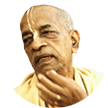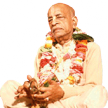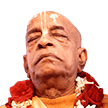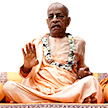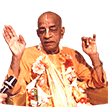Time Immemorial - an essential subject: Difference between revisions
(Created page with "Category:Essential Subjects <!----------------------- edit below this line -----------------------> <!------------------------ begin introduction text below --------------...") |
(Vanibot #0041: Moves Choose Another box to the end) |
||
| Line 2: | Line 2: | ||
<!----------------------- edit below this line -----------------------> | <!----------------------- edit below this line -----------------------> | ||
<!------------------------ begin introduction text below ------------------------> | <!------------------------ begin introduction text below ------------------------> | ||
The Personality of Godhead Lord Kṛṣṇa is un-embodied, omniscient, beyond reproach, without veins, pure and uncontaminated. He is responsible for fulfilling all the desires of the subordinate living entities since time immemorial. | |||
Srila Prabhupada's books, lectures, conversations and letters offer a comprehensive presentation of this essential subject as seen in the Vaniquotes '''[[Vaniquotes:Category:Time Immemorial|Time Immemorial]]''' category. An introduction from his books is given below in the following | Srila Prabhupada's books, lectures, conversations and letters offer a comprehensive presentation of this essential subject as seen in the Vaniquotes '''[[Vaniquotes:Category:Time Immemorial|Time Immemorial]]''' category. An introduction from his books is given below in the following 11 quotes. | ||
<!-------- end introduction text and don't touch next three lines ---------> | <!-------- end introduction text and don't touch next three lines ---------> | ||
---- | ---- | ||
== Quotes from Srila Prabhupada's books == | == Quotes from Srila Prabhupada's books == | ||
<!----------------- edit quote boxes below this line -----------------> | <!----------------- edit quote boxes below this line -----------------> | ||
{{VaniQuotebox| | {{VaniQuotebox|The individual soul is embodied since time immemorial. It is very difficult for him to simply theoretically understand that he is not the body|The individual soul is embodied since time immemorial. It is very difficult for him to simply theoretically understand that he is not the body. Therefore, the bhakti-yogī accepts the Deity of Kṛṣṇa as worshipable because there is some bodily conception fixed in the mind, which can thus be applied. Of course, worship of the Supreme Personality of Godhead in His form within the temple is not idol worship. '''(Bhagavad-gītā 12.5)'''}} | ||
{{VaniQuotebox| | {{VaniQuotebox|The Lord has innumerable devotees all over the universe, and they have been glorifying the Lord since time immemorial and for an unlimited time. But still they cannot completely finish enumerating the glories of the Lord| The Lord has innumerable devotees all over the universe, and they have been glorifying the Lord since time immemorial and for an unlimited time. But still they cannot completely finish enumerating the glories of the Lord. Pṛthu Mahārāja therefore wanted innumerable ears, as Rūpa Gosvāmī also desired to have millions of ears and millions of tongues to chant and hear the glorification of the Lord. '''(Śrīmad-Bhāgavatam 4.20.24)'''}} | ||
{{VaniQuotebox| | {{VaniQuotebox|It is ignorance acquired from time immemorial that is the cause of bodily suffering and distress. As soon as the living entity becomes aloof from the activities of the body, he becomes free from the reactions as well|It is ignorance acquired from time immemorial that is the cause of bodily suffering and distress. As soon as the living entity becomes aloof from the activities of the body, he becomes free from the reactions as well. As long as he is in the city of body, he appears to be the master of it, but actually he is neither its proprietor nor controller of its actions and reactions. He is simply in the midst of the material ocean, struggling for existence. '''(Bhagavad-gītā 5.14)'''}} | ||
{{VaniQuotebox| | {{VaniQuotebox|Impersonalists, who desire to become one with the Supreme, are unable to evaluate the devotees of the Lord. Thus from time immemorial these two transcendental pilgrims have sometimes been competitors|The devotees of the Lord, who do not wish to kill the individuality of the living entities and who desire to become personal servitors of the Lord, do not very much like the impersonalists, and similarly the impersonalists, who desire to become one with the Supreme, are unable to evaluate the devotees of the Lord. Thus from time immemorial these two transcendental pilgrims have sometimes been competitors. '''(Śrīmad-Bhāgavatam 1.7.11)'''}} | ||
{{VaniQuotebox| | {{VaniQuotebox|Hereditary gurus, or spiritual masters, have been accepted everywhere since time immemorial, but Prahlada Maharaja declined to accept such a seminal guru or take instruction from him|Hereditary gurus, or spiritual masters, have been accepted everywhere since time immemorial, but Prahlāda Mahārāja declined to accept such a seminal guru or take instruction from him. An actual guru is śrotriya, one who has heard or received perfect knowledge through paramparā, the disciplic succession. Therefore Prahlāda Mahārāja did not recognize a seminal spiritual master. Such spiritual masters are not at all interested in Viṣṇu. Indeed, they are hopeful of material success (bahir-artha-māninaḥ). '''(Śrīmad-Bhāgavatam 7.5.31)'''}} | ||
{{VaniQuotebox| | {{VaniQuotebox|The Vedic religion or the principles of the Vedas have been followed by the highly cultured population of India since time immemorial; no one can trace out the history of Vedic religion. Therefore it is sanatana|The Vedic religion or the principles of the Vedas have been followed by the highly cultured population of India since time immemorial; no one can trace out the history of Vedic religion. Therefore it is sanātana, and any blasphemy against the Vedas is calculated to be atheism. The Vedas are described as setu, which means "a bridge." If one wants to attain his spiritual existence, one has to cross an ocean of nescience. The Vedas are the bridge by which to cross such a great ocean. '''(Śrīmad-Bhāgavatam 4.2.31)'''}} | ||
{{VaniQuotebox| | {{VaniQuotebox|Millions of years ago, animal sacrifice and slave trade both existed. Indeed, they have existed since time immemorial|It appears that in those days a man could be purchased for any purpose. Hariścandra was in need of a person to sacrifice as the animal in a yajña and thus fulfill his promise to Varuṇa, and a man was purchased from another man for this purpose. Millions of years ago, animal sacrifice and slave trade both existed. Indeed, they have existed since time immemorial. '''(Śrīmad-Bhāgavatam 9.7.20)'''}} | ||
{{VaniQuotebox| | {{VaniQuotebox|This knowledge is perfect from time immemorial, and the brahminical or Vaisnava culture depends on this principle eternally|Only from Vedic knowledge can we understand the actual position of the Absolute Truth, who, as described in Śrīmad-Bhāgavatam, is manifested in three features—namely impersonal Brahman, localized Paramātmā and, at last, the Supreme Personality of Godhead. This knowledge is perfect from time immemorial, and the brahminical or Vaiṣṇava culture depends on this principle eternally. '''(Śrīmad-Bhāgavatam 4.21.42)'''}} | ||
{{VaniQuotebox|Since time immemorial, the sannyasa order has carried the tridanda|Since time immemorial, the sannyāsa order has carried the tridaṇḍa. Later Śaṅkarācārya introduced the ekadaṇḍi-sannyāsa. A tridaṇḍi-sannyāsī is a Vaiṣṇava sannyāsī, and an ekadaṇḍi-sannyāsī is a Māyāvādī sannyāsī. There are many other types of sannyāsīs, who are not approved by Vedic rituals. A type of pseudo-sannyāsa was introduced by Indra when he tried to hide himself from the attack of Vijitāśva, the great son of King Pṛthu. Now there are many different types of sannyāsīs. '''(Śrīmad-Bhāgavatam 4.19.22)'''}} | |||
{{VaniQuotebox|The individual soul bereft of Krsna consciousness has many ideas and activities created in the mind by the external energy. They have been existing from time immemorial|The individual soul bereft of Kṛṣṇa consciousness has many ideas and activities created in the mind by the external energy. They have been existing from time immemorial. Sometimes they are manifest in the wakening state and in the dream state, but during deep sleep (unconsciousness) or trance, they disappear. A person who is liberated in this life (jīvan-mukta) can see all these things vividly. '''(Śrīmad-Bhāgavatam 5.11.12)'''}} | |||
{{VaniQuotebox|Unless one is situated in Krsna consciousness, his material consciousness will oblige him to transfer from one body to another because he has material desires since time immemorial|Unless one is situated in Kṛṣṇa consciousness, his material consciousness will oblige him to transfer from one body to another because he has material desires since time immemorial. But he has to change that conception. That change can be effected only by hearing from authoritative sources. The best example is here: Arjuna is hearing the science of God from Kṛṣṇa. The living entity, if he submits to this hearing process, will lose his long-cherished desire to dominate material nature, and gradually and proportionately, as he reduces his long desire to dominate, he comes to enjoy spiritual happiness. '''(Bhagavad-gītā 13.22)'''}} | |||
<!----------------- edit quote boxes above this line -----------------> | <!----------------- edit quote boxes above this line -----------------> | ||
| Line 31: | Line 37: | ||
'''Time Immemorial- [[Vaniquotes:Category:Time Immemorial|explore more within this category]]'''. | '''Time Immemorial- [[Vaniquotes:Category:Time Immemorial|explore more within this category]]'''. | ||
{{EsentialSubjectTotal}} | {{EsentialSubjectTotal}} | ||
<div style="float:left;"> | |||
{{EssentialSubjectnav}} | |||
</div> | |||
__NOTOC__ | __NOTOC__ | ||
__NOEDITSECTION__ | __NOEDITSECTION__ | ||
Latest revision as of 17:55, 22 November 2020
The Personality of Godhead Lord Kṛṣṇa is un-embodied, omniscient, beyond reproach, without veins, pure and uncontaminated. He is responsible for fulfilling all the desires of the subordinate living entities since time immemorial.
Srila Prabhupada's books, lectures, conversations and letters offer a comprehensive presentation of this essential subject as seen in the Vaniquotes Time Immemorial category. An introduction from his books is given below in the following 11 quotes.
Quotes from Srila Prabhupada's books
Time Immemorial- explore more within this category.
Vanipedia has now over 903 introductory articles compiled from Srila Prabhupada's books under the series titled Essential Subjects. All these articles can be seen in the Table of Content on the right side of this article and also here in this Umbrella Category. Browse through them to relish the breadth and depth of Srila Prabhupada's teachings - There is a subject for everyone.


